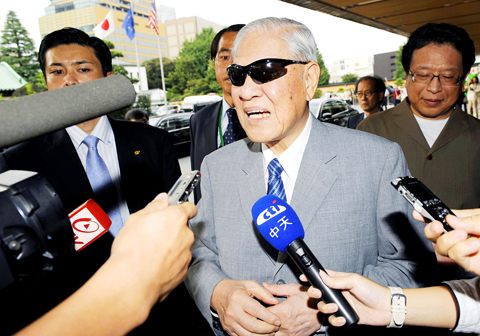Former president Lee Teng-hui (李登輝) arrived in Japan yesterday for a week-long stay.
The visit is the fifth by Japan-educated Lee, 86, since he stepped down as president nine years ago. During his 1988 to 2000 term, he nurtured democracy and tried to promote a separate identity for Taiwan.
Each of Lee’s Japan trips has triggered protests from China, which sees them as attempts to strengthen Taiwan’s status, although the complaints have grown less vehement.

PHOTO: AP/KYODO NEWS
Japan does not require visas for Taiwanese tourists and Lee has said the visit is private.
Lee, wearing a grey suit, arrived at Narita Airport near Tokyo accompanied by his wife and was heavily guarded by security officers.
He was greeted by a small group of supporters waving the flags of Japan and Taiwan.
Lee plans to deliver a speech in Tokyo on Japanese society today. He is then scheduled to fly to Kochi and Kumamoto in southern Japan to deepen ties with business groups before heading back to Taiwan on Thursday.
On a visit to Japan last year, Lee said that an island group disputed between Japan, Taiwan and China was “a territory of Japan.”
The archipelago in the East China Sea is known in Japan as the Senkaku Islands and as the Diaoyutai (釣魚台) Islands in Taiwan.
“The land of the Senkaku Islands belongs to Okinawa, therefore it is a territory of Japan,” Lee said in an interview carried in the Okinawa Times in southern Japan.
During a visit in 2007, Lee mourned his late brother at Tokyo’s controversial Yasukuni war shrine.
The Shinto shrine venerates those who died in wars while fighting for Japan, including convicted war criminals from World War II.
Lee’s elder brother is enshrined at Yasukuni because he died serving in the Japanese navy in the Philippines in February 1945 when Taiwan was a Japanese colony.

A preclearance service to facilitate entry for people traveling to select airports in Japan would be available from Thursday next week to Feb. 25 at Taiwan Taoyuan International Airport, Taoyuan International Airport Corp (TIAC) said on Tuesday. The service was first made available to Taiwanese travelers throughout the winter vacation of 2024 and during the Lunar New Year holiday. In addition to flights to the Japanese cities of Hakodate, Asahikawa, Akita, Sendai, Niigata, Okayama, Takamatsu, Kumamoto and Kagoshima, the service would be available to travelers to Kobe and Oita. The service can be accessed by passengers of 15 flight routes operated by

Alain Robert, known as the "French Spider-Man," praised Alex Honnold as exceptionally well-prepared after the US climber completed a free solo ascent of Taipei 101 yesterday. Robert said Honnold's ascent of the 508m-tall skyscraper in just more than one-and-a-half hours without using safety ropes or equipment was a remarkable achievement. "This is my life," he said in an interview conducted in French, adding that he liked the feeling of being "on the edge of danger." The 63-year-old Frenchman climbed Taipei 101 using ropes in December 2004, taking about four hours to reach the top. On a one-to-10 scale of difficulty, Robert said Taipei 101

MORE FALL: An investigation into one of Xi’s key cronies, part of a broader ‘anti-corruption’ drive, indicates that he might have a deep distrust in the military, an expert said China’s latest military purge underscores systemic risks in its shift from collective leadership to sole rule under Chinese President Xi Jinping (習近平), and could disrupt its chain of command and military capabilities, a national security official said yesterday. If decisionmaking within the Chinese Communist Party has become “irrational” under one-man rule, the Taiwan Strait and the regional situation must be approached with extreme caution, given unforeseen risks, they added. The anonymous official made the remarks as China’s Central Military Commission Vice Chairman Zhang Youxia (張又俠) and Joint Staff Department Chief of Staff Liu Zhenli (劉振立) were reportedly being investigated for suspected “serious

Taiwanese and US defense groups are collaborating to introduce deployable, semi-autonomous manufacturing systems for drones and components in a boost to the nation’s supply chain resilience. Taiwan’s G-Tech Optroelectronics Corp subsidiary GTOC and the US’ Aerkomm Inc on Friday announced an agreement with fellow US-based Firestorm Lab to adopt the latter’s xCell, a technology featuring 3D printers fitted in 6.1m container units. The systems enable aerial platforms and parts to be produced in high volumes from dispersed nodes capable of rapid redeployment, to minimize the risk of enemy strikes and to meet field requirements, they said. Firestorm chief technology officer Ian Muceus said